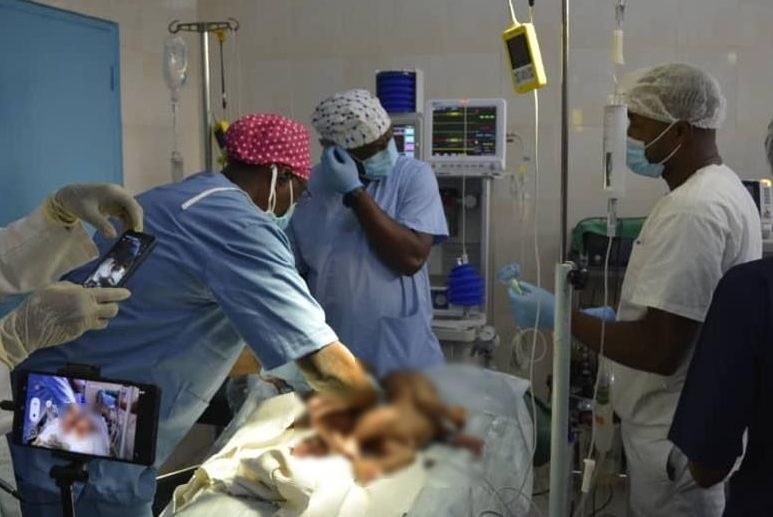
A Moment of Triumph: The First Surgery in Guinea to Successfully Separate Conjoined Twins
The First Surgery in Guinea to Successfully Separate Conjoined Twins


The First Surgery in Guinea to Successfully Separate Conjoined Twins

For the first two months of their lives, the twin brothers from the small village of Songbanya, 64 kilometers from Faranah city in western Guinea, had lived life joined to each other at their lower back.
But on Jan. 19, 2021, they found themselves in the capital city of Conakry surrounded by an operating team of physicians and nurses, performing a complex surgery that held the hope of not only profoundly changing their lives but also marking a triumphant milestone in surgical and anesthesia care in Guinea.
Hours later, the two babies lay side-by-side sleeping and recovering, as a family, operating team, health community, and nation celebrated the first-ever successful surgery to separate conjoined twins in Guinea’s history. Just six years before, the country’s last-known case of conjoined twins—two boys born in 2015—were transported to France to undergo separation surgery, making this a major demonstration of growth for neonatal emergency care and the surgical health system in alignment with Guinea’s 2015-2024 national health policy priorities.
This moment also highlights the dedication, expertise, and teamwork of the team of surgeons, anesthesiologists, non-physician anesthesia providers, nurses, and technicians to source, plan, and execute the surgery—from the complexity of the operation itself to creating a custom operating theater in the private Clinique Ambroise Paré with difficult-to-source neonate-compatible equipment, accessories, and consumables. As a longtime partner of health facilities in Guinea, we congratulate the entire clinical and technical team for their tremendous achievement, and are honored the Universal Anaesthesia Machine (UAM) could support during this important moment.
“Our specialty requires the right technology and equipment, the right training, the right teamwork—it’s all interconnected.”
For Dr. Joseph Donamou, lead anesthesiologist in the surgery and Gradian clinical trainer, this achievement demonstrates confidence, trust, and a self-reliance that has led to immense pride across the nation of nearly 13 million, through news coverage and recognition from country leaders. The surgery also showcases the integrated system that needs to work well to ensure patients receive the right care. “Our specialty requires the right technology and equipment, the right training, the right teamwork—it’s all interconnected,” says Dr. Donamou.
To many, this milestone highlights the surgical and anesthesia expertise that has been built up in the country so far and a renewed focus on continuing to invest in skills. “We have a lot of skills because I must tell you that I was really surprised that the anesthesiologist team on the spot was able to put them to sleep easily. It proves that if we get together … we can operate [on] all these children,” stated Dr. Ballamoussa Touré, head pediatric surgeon during the operation, told a local news outlet after the operation.
“We have good people—both physician and non-physician anesthesia providers—we need to build on that.”
“We have good people—both physician and non-physician anesthesia providers—we need to build on that,” says Dr. Donamou. This operation shines a light on the critical importance of education and training to cultivate the skills and expertise to provide high-quality anesthesia care. One recent step toward this is the launch in 2019 of the country’s first-ever three-year anesthesia training program for non-physicians at Gamal Abdel Nasser University of Conakry. Donamou, who helped establish and lead this program, says that continued and increasing investment in anesthesia education and equipment is critical to build upon the momentum of this moment.
At Gradian, we stand committed to supporting this growth and the healthcare providers that through their work change the trajectories and prospects of lives, communities, and countries.